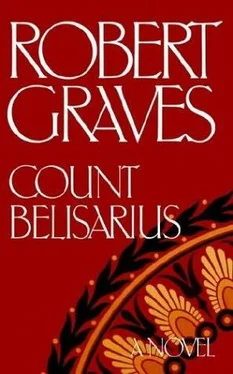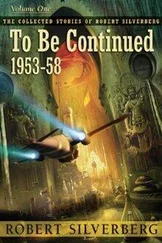Robert Graves - Count Belisarius
Здесь есть возможность читать онлайн «Robert Graves - Count Belisarius» весь текст электронной книги совершенно бесплатно (целиком полную версию без сокращений). В некоторых случаях можно слушать аудио, скачать через торрент в формате fb2 и присутствует краткое содержание. Жанр: Исторические приключения, на английском языке. Описание произведения, (предисловие) а так же отзывы посетителей доступны на портале библиотеки ЛибКат.
- Название:Count Belisarius
- Автор:
- Жанр:
- Год:неизвестен
- ISBN:нет данных
- Рейтинг книги:3 / 5. Голосов: 1
-
Избранное:Добавить в избранное
- Отзывы:
-
Ваша оценка:
- 60
- 1
- 2
- 3
- 4
- 5
Count Belisarius: краткое содержание, описание и аннотация
Предлагаем к чтению аннотацию, описание, краткое содержание или предисловие (зависит от того, что написал сам автор книги «Count Belisarius»). Если вы не нашли необходимую информацию о книге — напишите в комментариях, мы постараемся отыскать её.
Count Belisarius — читать онлайн бесплатно полную книгу (весь текст) целиком
Ниже представлен текст книги, разбитый по страницам. Система сохранения места последней прочитанной страницы, позволяет с удобством читать онлайн бесплатно книгу «Count Belisarius», без необходимости каждый раз заново искать на чём Вы остановились. Поставьте закладку, и сможете в любой момент перейти на страницу, на которой закончили чтение.
Интервал:
Закладка:
'Who divided the Red Sea?' Simeon breaks in, indignantly. 'Or who in later times passed dry-shod over Jordan? As for dancing rocks, does not David the psalmist write: "Why hop ye so, ye high lulls?" lurpriscd at the power of his own sacred melody?'
'The Thracian plain,' resumes Modestus with a grimace of contempt, 'first bloodlessly annexed to Rome by that scholarly Emperor who conquered foggy Britain and added Morocco to the Empire — Claudius, his name — ah, you Greek-speaking inhabitants of the Eastern half of our Empire, you mixed multitude, do not forget that it was we Romans, not half-breed Greeks, who first won for you the dominions in which you now boast yourselves — it was our native-born Mummius, Paullus, Pompey, Agrippa, Titus, Trajan…'
'A most unselfish set of gentlemen, I am sure,' puts in the burgess Milo, a Thracian, drily; and he, too, feels it his duty to propitiate Bessas, muttering something behind his hand.
'Drink up. Sir!' orders Malthus. 'A new round of wine is about to begin. Let us all pledge the name of Rome, our common mother!'
Simeon agrees recklessly: 'I am ready, Schoolmaster. That wine which was poured during the marriage-feast at Cana of Galilee would not yield in quantity and quality to this; and as for these fish-cakes, why, the miraculous draught of fishes itself could never
…'
So unpleasantness is once more avoided, but Modestus cannot resist continuing on the topic of the unconquerable Roman soldiery. 'Now tell me, my learned friends at that end of the table, and my gallant friends at this- what was the secret of the Roman soldiers' unexampled success? Tell me that! Why did they win battle after battle in Southern sands, in Northern snows, or against the painted Briton and the gilded Persian? Why was it that Rome, the capital of the world, had no need of walls and that almost the only fortresses in the whole Empire were block-houses on the remote frontiers? Why? Let me tell you, my gallant and learned friends. There were three reasons. The first: these Romans trusted to their own visible tutelary gods, the golden Eagles of their legions, who guarded them and whom they themselves guarded, and to no hypothetic divinity in Heaven above the clouds. The second: they trusted to their own powerful right arms for hurling missiles — sharp javelins — not to the adventitious bowstring; and in these right arms wielded the short, stabbing sword, the weapon of the courageous, civilized man, not the cowardly lance or the hurtling, barbaric battle-axe. The third: they trusted to their own steadfast legs, not to the timorous legs of horses.'
'Ho, ho, ho,' laughs Bessas. 'My worthy host, Distinguished Lord Modestus, will you forgive my frankness if I tell you that you are talking a great deal of nonsense? I shall leave the more religious-minded of the company to dispute your account of the power of the Eagles as gods, which I certainly think, though I am not an expert in such matters, is not only blasphemous but an exaggeration of fact; but I will take you up most strongly on the other points. In the first place, I understand you to despise the bow as a weapon of no account…
'Have I not the authority of Homer for doing so, who presents his noblest heroes as fighting at Troy (dismounted from their chariots) hand to hand, with javelin and sword? The bow at Troy was the weapon of the effeminate and treacherous Paris, and of Salaminian Teucer, who skulked behind his brother Ajax's shield, and who later was refused permission to return honourably home to his violet-scented island city, because he had not avenged his brother Ajax's death as any decent shield-and-sword fighter would have done. In the only passage indeed where the word "archer" occurs in all the divine works of blind Homer, it is used as a term of ridicule. Diomcdc named Paris, in the Eleventh Book, "An archer, a jokester, a dandy with a lovelock, who gapes after girls"; and "archer" was the hardest name of all. The archer in Homer's poems skulks behind a comrade's shield, I repeat, or behind a mound, or a pillar, or a gravestone, and the shield-and-sword man resents his existence, as stealing from the battle (which he never enters) something which is not his. Is this not the truth, you scholars? Malthus, Symmachus, Palaeologus, I appeal to you.'
They acknowledge that Modestus has neither misquoted nor misinterpreted Homer.
But Bessas snorts and asks to hear more. 'Tell us about the Roman warriors of your golden age. They trusted to their legs, did they? Was it perhaps because they were such unskilful horsemen?'
Modestus's eye kindles. 'The infantryman is the acknowledged king of the battle-field. Horses are useful for mounting scouts upon, and for conveying generals and their staff quickly from one point of the battle to another, and for pulling wagons and siege-engines, and — yes, I grant you this — we may allow a small proportion of cavalry to every large body of infantry, in order to disperse the skirmishers of the enemy who, from a flank, may annoy the steadily advancing ranks of our foot-sure legions. But the Romans of old so disdained cavalry-service that, as soon as their conquests permitted them, they compelled subject nations to undertake that menial task for them — as they also ceased to drive the plough themselves or to plant cabbages, entrusting such employment to slaves and men of inferior race. Is that not so, Malthus, Symmachus, Palaeologus?'
They agree that the Romans early came to depend on allied cavalry. But Malthus, in historical honesty and fairness to Bessas, adds: 'Yet I think that no nation disdains what it excels in. The Roman cavalry were never very skilful. In Spain, on the last occasion that they were employed as a field-force they made a sorry exhibition of themselves; or so we read. Similarly, neither the Greeks nor the Trojans of Homer's day seem to have been capable archers, according to modern standards. They drew the bowstring back only to their breasts (not to the ear, as the Huns do, or the Persians), and the penetrative effect of their arrows seems only to have been slight. Ulysses was more successful, I grant you; but his archery against the suitors was at close range, and against unarmoured, unsuspecting men.'
Then Bessas has his say. He speaks slowly and judiciously, being the sort of man whom wine makes cautious, not rash. 'Modestus, my generous host, you live in a world long dead, shut in that book-cupboard yonder. You have no conception of the nature of modern fighting. In every age there are improvements. In this age we Goths have hit upon a perfected mode of fighting. Now I do not wish to denigrate the successes of the Romans, your ancestors, in olden times-they are undeniable. It is clear that they made a virtue of their deficiency as horsemen by perfecting the discipline of their foot. But clearly their battles were won in spite of their mistrust of hones, not because of it. Had they been natural horsemen and applied their courage and good sense to the evolution of the cavalry arm, they might well have conquered not merely the whole Western world, but India, I believe, and Bactria, and even China, which lies, by land, a year's travel away. But instead they relied on their infantry, and at last their armies were matched against a brave nation that was also a nation of horsemen — a nation, moreover, that obeyed its chiefs — the Gothic nation — my nation. That was the end of the Roman legions. These Thracian plains, Distinguished Modestus, have seen sterner sights than drunken women and dancing rocks. Simeon, Milo, Theudas' (this was the other Thracian, a land-owner) 'and you boys too, as soldiers to be, am I telling the truth, or am I not?'
They acknowledge that he is telling the truth, and Thcudas adds: 'Indeed, Bessas, you are right, it must have been a terrible slaughter. Forty thousand Roman infantry butchered, with all their officers, and the Emperor Valens himself at their head. It was on fields now owned by me about eight miles to the northward of this city that the battle was fought. The thirty-acre plough-land is still full of bones, skulls, and fragments of armour, and arrow and javelin heads, and shield bosses, and gold and silver coins: every spring we turn them up.'
Читать дальшеИнтервал:
Закладка:
Похожие книги на «Count Belisarius»
Представляем Вашему вниманию похожие книги на «Count Belisarius» списком для выбора. Мы отобрали схожую по названию и смыслу литературу в надежде предоставить читателям больше вариантов отыскать новые, интересные, ещё непрочитанные произведения.
Обсуждение, отзывы о книге «Count Belisarius» и просто собственные мнения читателей. Оставьте ваши комментарии, напишите, что Вы думаете о произведении, его смысле или главных героях. Укажите что конкретно понравилось, а что нет, и почему Вы так считаете.












